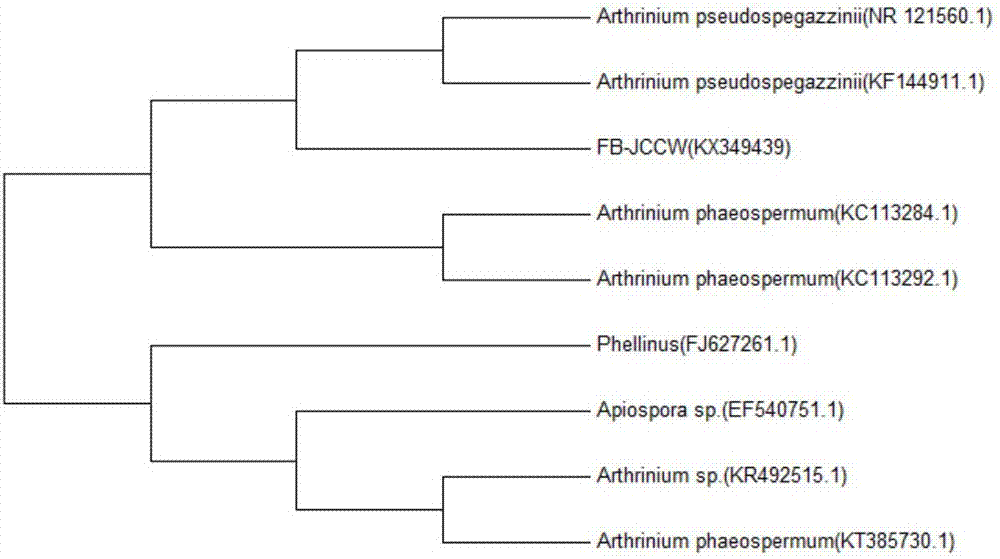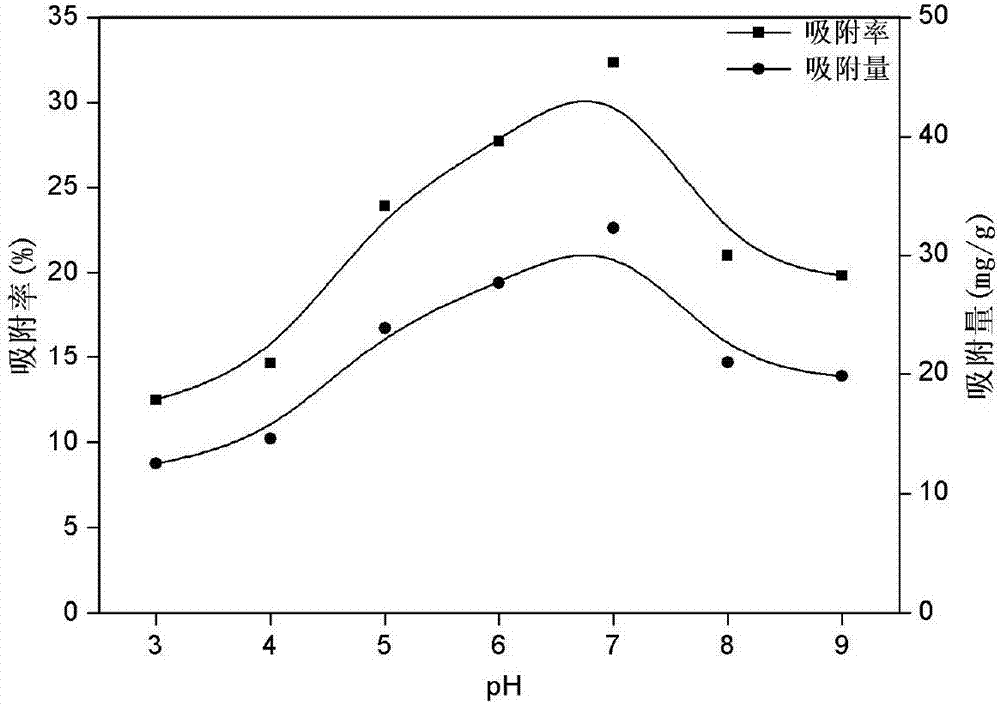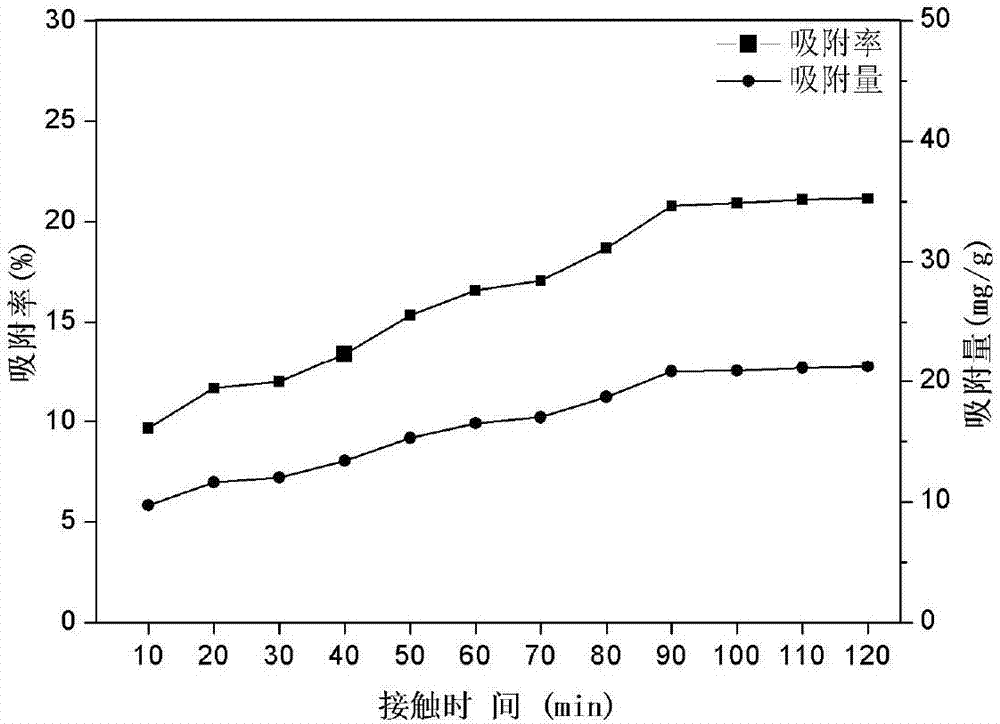Biological absorbent capable of adsorbing thallium ions, preparation method and applications thereof
A biosorbent and ion technology, which is applied in the application fields of biosorbent, biological treatment of sewage, and thallium pollution bioremediation engineering, can solve the problems of unsatisfactory treatment effect, high cost, secondary pollution and so on.
- Summary
- Abstract
- Description
- Claims
- Application Information
AI Technical Summary
Problems solved by technology
Method used
Image
Examples
Embodiment 1
[0040] Example 1: Isolation and identification of strain FP-JCCW
[0041] (1) Separation and purification of strain FP-JCCW
[0042] The strain FP-JCCW was isolated and screened from the plants in the Dabaoshan mining area in Shaoguan, Guangdong. The culture medium of the isolated strain FP-JCCW is Chashi medium.
[0043] The composition of the Cha's medium is: NaNO 3 3g, K 2 HPO 4 ·3H 2 O 1g, MgSO 4 ·7H 2 O 0.5g, KCl0.5g, FeSO 4 ·7H 2 O 0.01g, sucrose 30g, agar 20g, distilled water 1000mL. The preparation process of this Chashi medium can refer to the prior art, and will not be described in detail here.
[0044] The freshly cultivated strain FP-JCCW in the logarithmic phase was made into a spore suspension, and 1 mL of the spore suspension was applied to a certain concentration of thallium-containing medium, and placed in a 28°C constant temperature incubator for 48 hours to observe whether there are colonies If a colony grows, another 1 mL of the spore suspension is inoculated in...
Embodiment 2
[0051] Example 2: Preparation of biosorbent and its adsorption performance for thallium
[0052] (1) Preparation of biosorbent
[0053] Filter the cultured strain FP-JCCW with 8 layers of gauze, wash the collected mycelium with deionized water 3 times, dry it naturally, and place it in an oven at 60°C to a constant weight. After cooling, grind the mycelium into Fine powder, sieved and set aside.
[0054] (2) Adsorption test method
[0055] Take 50ml Tl solution of different concentration in a 100ml Erlenmeyer flask, use 0.1mol / L HNO 3 Or NaOH will Tl + Adjust the pH value of the solution to a series of values (3~9), Tl + The initial concentration variables are 20-100mg / L, the contact time variables are 10-120min, the shaker speed variables are 30-180r / min, the temperature variables are 20-40℃, and the strain biomass variables are 0.5-5g. / L, set up a set of experiments for each variable, and set up 3 repetitions for each set of experiments to test the adsorption rate and adsorption...
Embodiment 3
[0068] Example 3: Characterization and analysis of strain FP-JCCW
[0069] (1) FT-IR characterization analysis
[0070] Take an appropriate amount of dried bacterial strain powder and grind together with KBr, press the tablet, and then use the TENSOR 27 Fourier Transform Infrared Spectrometer (Bruker, Germany) at 400~4000cm -1 Scan within range.
[0071] Figure 8 FT-IR diagrams before and after Tl adsorption of strain FP-JCCW. From Figure 8 It can be seen that the strain FP-JCCW is at 3390cm before adsorbing Tl -1 There is one absorption peak at 2925cm, which is caused by O-H bond stretching and contraction; -1 And 2856cm -1 There is one absorption peak at each place, which is caused by the expansion and contraction of the C-H bond; at 1743cm -1 There is an absorption peak at 1635cm, which may be caused by aldehyde group-CHO stretching; -1 The absorption peak at is caused by the stretching vibration of the C=O bond and the bending vibration of the N-H bond in the protein amide; a...
PUM
| Property | Measurement | Unit |
|---|---|---|
| Adsorption capacity | aaaaa | aaaaa |
Abstract
Description
Claims
Application Information
 Login to View More
Login to View More - R&D
- Intellectual Property
- Life Sciences
- Materials
- Tech Scout
- Unparalleled Data Quality
- Higher Quality Content
- 60% Fewer Hallucinations
Browse by: Latest US Patents, China's latest patents, Technical Efficacy Thesaurus, Application Domain, Technology Topic, Popular Technical Reports.
© 2025 PatSnap. All rights reserved.Legal|Privacy policy|Modern Slavery Act Transparency Statement|Sitemap|About US| Contact US: help@patsnap.com



